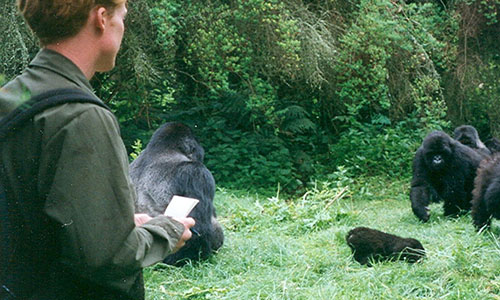Age Limit for Gorilla Habituation Experience in Bwindi Uganda
The age limit for gorilla habituation experience in Bwindi and gorilla trekking in Uganda, Rwanda, and the Democratic Republic of Congo is 15 years old. This restriction is in place to ensure the safety of both the participants and the gorillas. Younger children may struggle with the physical demands of trekking and could potentially react unpredictably in the presence of wild gorillas. The Gorilla Habituation Experience is more strenuous than traditional gorilla trekking, often involving several hours of hiking through steep and dense forest terrain. Therefore, participants must be in good physical condition to handle the challenges of the trek.
Gorilla Habituation Experience in Bwindi Impenetrable National Park
 The Gorilla Habituation Experience in Uganda’s Bwindi Impenetrable National Park offers a rare opportunity to observe mountain gorillas as they adapt to human presence. To participate, individuals must be at least 15 years old, a rule strictly enforced to protect both visitors and gorillas. The experience involves challenging treks through dense forest, requiring physical endurance.
The Gorilla Habituation Experience in Uganda’s Bwindi Impenetrable National Park offers a rare opportunity to observe mountain gorillas as they adapt to human presence. To participate, individuals must be at least 15 years old, a rule strictly enforced to protect both visitors and gorillas. The experience involves challenging treks through dense forest, requiring physical endurance.
Unlike standard gorilla trekking, which allows only one hour with the gorillas, the habituation process provides up to four hours of observation. This immersive encounter offers deeper insight into the lives of these majestic animals.
Due to the limited availability of gorilla habituation permits—just eight per day, divided into two groups of four—early booking is essential. Each permit costs $1,500 per person.
To make the most of this unforgettable gorilla experience, participants should plan ahead, ensure they meet the age requirement, and prepare for the physically demanding terrain of Bwindi’s lush forest.
If you’re planning a gorilla trip and you happen to have younger children, consider exploring alternative wildlife experiences in the region that cater to families. Contact us today for a price quotation for Bwindi habituation safari in Uganda.
Other Gorilla Rules
Gorilla habituation experience and gorilla trekking are remarkable wildlife experiences, but they come with strict rules and regulations to protect the endangered gorillas and ensure the safety of visitors. These regulations vary slightly depending on the country (e.g., Uganda, Rwanda, or the Democratic Republic of Congo), but the general guidelines have to be followed. By adhering to the rules below, you are contributing to the conservation of mountain gorillas and ensure the sustainability of its extraordinary tourism:-
Before Trekking
Permits Required
Obtain a valid gorilla trekking permit. Each permit allows access to a specific gorilla group and is typically limited to eight visitors per group per day.
Health Requirements
Do not trek if you are ill or showing symptoms of an infectious disease, as gorillas are highly susceptible to human diseases.
Fitness Level
Ensure you are physically fit. The trekking involves hiking through dense forests, steep terrain, and varying weather conditions.
Preparation
Wear suitable clothing, such as waterproof hiking boots, long-sleeved shirts, and long trousers.
Bring essentials like water, snacks, a raincoat, gloves, and insect repellent.
During the Trek
Follow the Guide
Always stay with your assigned guide and ranger. They are trained to ensure your safety and minimize disturbance to the gorillas.
Group Size and Distance
Maintain the group size of eight visitors.
Keep a minimum distance of 7 meters (21 feet) from the gorillas.
Behavior Around Gorillas
Remain calm and quiet.
Do not eat, drink, or smoke near the gorillas.
Avoid sudden movements or loud noises.
Photography:
Flash photography is strictly prohibited.
Use a camera with a silent shutter mode.
Health and Hygiene
No Littering
Carry out all waste, including biodegradable items, to protect the habitat.
Sneezing or Coughing
Cover your mouth and turn away from the gorillas if you need to sneeze or cough.
No Physical Contact
Never attempt to touch or feed the gorillas.
Safety Rules
Avoid Direct Eye Contact
While eye contact is not always aggressive, prolonged staring may be interpreted as a threat by the gorillas.
Follow Instructions
In case of a charge or aggressive behavior from a gorilla, follow the ranger’s instructions. They are trained to handle such situations.
Leave If Asked:
If the rangers or guides feel that staying in the area could stress the gorillas, be prepared to leave the site immediately.
After the Trek
Feedback and Compliance
Share feedback with the authorities and report any issues encountered during the trek.
Respect Conservation Efforts
Understand that the fees paid for gorilla trekking permits support conservation efforts and the local community.